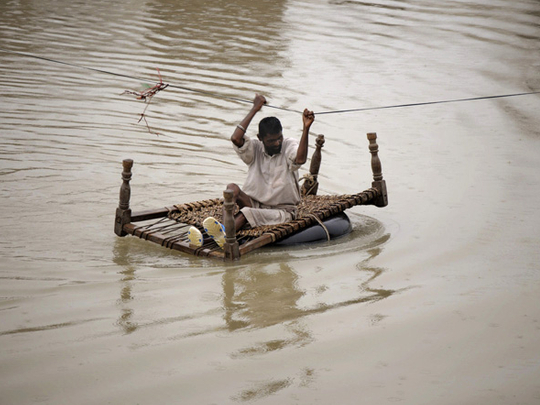
Sukkur, Pakistan: Pakistani troops, spearheading rescue and relief efforts in the worst floods in 80 years, evacuated several thousand people in two provinces overnight after flood waters burst through river embankments.
President Asif Ali Zardari's civilian government has been overwhelmed by the disaster which has killed over 1,600 people, disrupted 12 million lives and ruined many crops vital for the agriculture-based economy.
The military, which has maintained a dominant role in foreign and security policy even during civilian rule, has often stepped in to manage natural crises.
Saleh Farooqui, director general of the National Disaster Management Authority in Sindh province, told Reuters up to 10,000 people were evacuated overnight in Punjab province, and several thousand in Sindh. Rescue efforts were still under way.
Zardari drew heavy criticism for leaving the country for officials visits in Europe during the crisis. He has said the prime minister was handling the crisis and reporting developments to him.
Even though relief efforts may have improved the military's standing, and widened the perception that Pakistani civilian governments are too weak and inefficient to cope with disasters, analysts say a takeover bid is highly unlikely.
The army is busy fighting Taliban insurgents and does not want to be strapped with Pakistan's enormous problems -- from costly rebuilding after the floods to the struggle to attract foreign investment in a troubled economy to widespread poverty.
"I don't think they are willing to dump Zardari," said Kamran Bokhari, Regional Director, Middle East and South Asia at global intelligence firm STRATFOR.
"The current army leadership ... is very clear that there is a war that needs to be waged."
Foreign aid organisations, also playing a much bigger role than the government, say weather has hampered relief efforts and the floods have wiped out some of their supplies.
Many people are still stranded, surrounded by huge tracts of water and more heavy rains are expected. Others have been evacuated from their villages but are living out in the open, with little food or drinking water.
In the agricultural heartland Punjab, hundreds of people were evacuated from drenched areas to a railway track on higher ground. A military helicopter was due to land to rescue them but could not due to poor weather.
"What we are wearing is all that we have, the rest is all gone - our house, animals, wheat we had stored, everything has been destroyed," university student said Fiza Batool as she fed her 10-year-old sister biscuits.
Floodwaters have roared down from as far away as Afghanistan and India through the northwest to the agricultural heartland of Punjab and on to southern Sindh along a trail more than 1,000 km (600 miles) long.
Raging waters have spread for tens of kilometres from rivers, wiping out entire villages. All Pakistanis can do is try to gather logs which have not been washed away from their obliterated homes.
Heavy rain is expected to lash the country again raising the prospect that more homes and crops will be swept away.
Flooding has also taken a toll over the border in the Indian state of Jammu and Kashmir, where rain was hampering rescue and relief efforts. Flash floods have killed at least 132 people in the Himalayan region of Ladakh.
Mudslides engulfed a town in northwest China on Sunday, killing at least 80 people and leaving 2,000 residents missing as rescue teams dug through crushed homes and readied a blast to dislodge debris blocking a river.












